Iran Among Worst Countries In Gender Gap Index - World Economic Forum
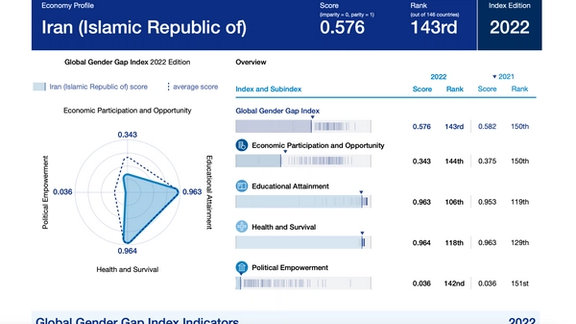
The World Economic Forum has published its latest report on the Global Gender Gap Index, placing Iran at the rock bottom only after Afghanistan, Pakistan, and Congo.

The World Economic Forum has published its latest report on the Global Gender Gap Index, placing Iran at the rock bottom only after Afghanistan, Pakistan, and Congo.
The 2022 report, which was released 13 July, benchmarks the current state and evolution of gender parity across four major dimensions of Economic Participation and Opportunity, Educational Attainment, Health and Survival, and Political Empowerment as well as in several other categories. Now in its 16th year, the report analyzed the evolution of gender-based gaps in 146 countries, providing a basis for robust cross-country analysis.
On average Iran finished 143rd in the list but in economic participation, Iran sits at the 144th place; in political empowerment, the Islamic Republic is the 142nd country; in health and survival, Iran ranks 118th; and in educational attainment on the 106th spot.
Iranian women held a nationwide civil disobedience protest on Tuesday (July 12) against the Islamic Republic’s forced dress code, while the government has recently increased harassment of women for their insufficient hijab and many have been detained by special police patrols. This has led to more tension amid economic hardship for 90 percent of the population on fixed income, while inflation has reached 55 percent and food prices have risen by more than 80 percent, according to May-June official reports. (https://www.iranintl.com/en/202207120933)
In another report published by the Economist intelligence unit -- the research and analysis division of The Economist -- on June 23, Tehran stands at the 163rd place of the list of 173 cities in Global Liveability Index, which quantifies challenges to an individual's lifestyle in cities worldwide.
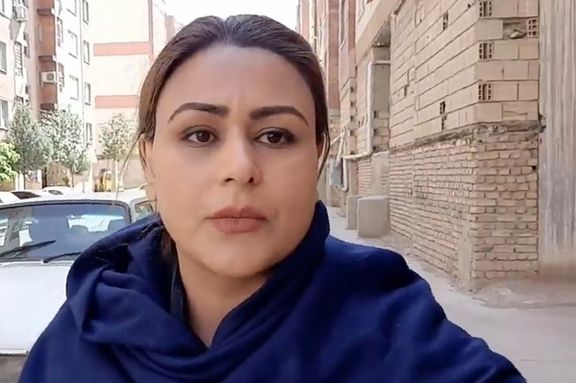
Iran has started arresting women who participated in a nationwide civil disobedience campaign July 12 against the compulsory Islamic dress code, or hijab.
Souri Babai Chegini, a civil activist who published a video removing her hijab, was arrested Wednesday evening, July 13, in Qazvin, probably the first activist detained following the anti-hijab protests.
According to her husband, Mohammad-Reza Morad-Behrouzi, eight agents, including two women, raided his brother-in-law's house and arrested the activist. The security forces seized her children's cellphones as well as hers and threatened her 13-year-old daughter.
Melika Qaragozlu, another woman who took off her headscarf on Tuesday and shared a video on Social media, was arrested Thursday morning.
In her video on the anti-hijab day, Chegini also criticized various other discriminations against women, including their share in inheritance compared to men, the right to custody of children and divorce, the right to travel to other countries without the consent of a male guardian, as well as Muslim men’s right for formal marriage with four women and their right to infinite number of concubines (in Shiite sect).
Following a call by women’s rights activists for civil disobedience with the hashtag of ‘No2Hijab’ social media exploded with dozens of videos and photos of women unveiling in public.
For the past few weeks, the government has increased harassment of women for their insufficient hijab and many have been detained by special police patrols.

A Swedish court on Thursday sentenced former Iranian jailor Hamid Nouri to life in prison for his role in a purge of political prisoners in Iran in 1988.
Nouri was a former deputy prosecutor at Gohardasht Prison in Karaj near Tehran at the time of the killings.
He was charged with “war crimes, crimes against humanity, torture, and participating in the continued crime of refusing to return the bodies of executed prisoners to their families.” He has denied any wrongdoing and said plaintiffs' allegations were a "completely imaginary story".
Witnesses have told Swedish prosecutors that Nouri, who went by the alias Hamid Abbasi at the time, was responsible for handing down death sentences and taking prisoners to where they were hanged or shot.
There are allegations that Iran seeks to exchange Nouri with Swedish-Iranian scientist and academic Ahmad-Reza Djalali arrested on vague charges of espionage and collaboration with Israel in 2016 and sentenced to death in 2017.
Sweden arrested Nouri, now 61, upon his arrival in Sweden at Stockholm Airport in 2019 and in 2021put him on trial over the mass execution and torture of prisoners at Gohardasht Prison in July and August 1988.
Most of victims were linked to the opposition group Mujahedin-e Khalq Organization (MEK) but there were also some with links to leftist and secular groups such as Fadaiyan Khalq Organization (FKO) and Tudeh Party as well as some Kurdish groups such as Komala and Kurdish Democratic Party of Iran.
On the eve of the court ruling on July 13, Iran repeated calls for his release, saying Nouri’s detention is driven by “false allegations” made by the Albania-based MEK.
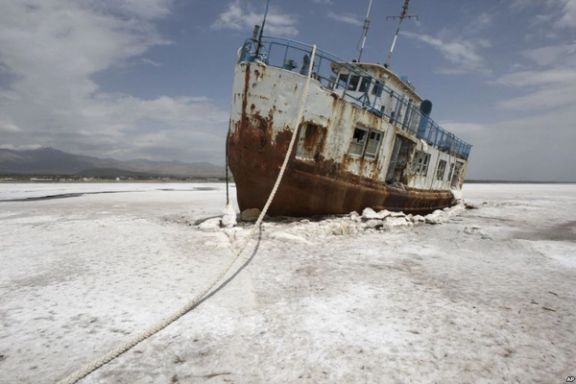
The head of Crisis Management of Iran’s northwestern West Azarbaijan province says Lake Orumiyeh (Urmia) has lost about 95 percent of its water.
Amir-Abbas Jafari said on Wednesday that Iran's most famous lake has lost an average of 40 centimeters of its depth per year over the past two decades.
He said drought, water evaporation, mismanagement in development of horticulture and unscientific use of region’s water for growing crops are among the most important factors of Lake Urmia’s gradual disappearance.
The central and provincial governments are determined to revive the lake, Jafari noted.
Experts say groundwater extraction and using the water of the once bountiful Zarrineh Rud − which feeds Urmia Lake − for irrigating apple trees have both contributed to the lake shrinking by nearly 95 percent in volume over the past 20 years. In 2021 alone, more than 100,000 tons of apples of the province’s production went to waste.
Urmia, which is the largest lake in Iran and the sixth largest salt lake in the world began shrinking in the mid-1980s and was in danger of disappearing altogether until recovery plans began to be implemented in 2014.
According to authorities at the government of President Hassan Rouhani, 150 trillion rials – which can be about one billion dollars considering the lower rate of dollar against rial back then – were allocated for the plan in seven years as well as another $10 million aid by Japan and some other amounts by the United Nations Food and Agriculture Organization (FAO) and the United Nations Development Program (UNDP) to save the lake. It is not clear whether or how the earmarked budget was spent.
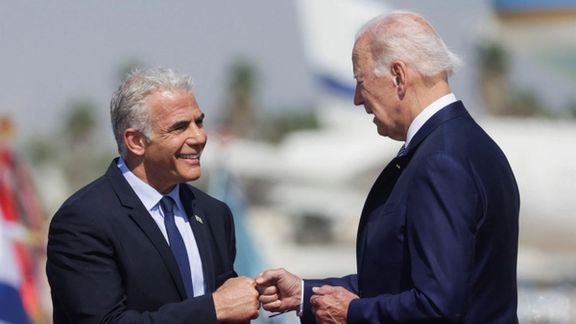
Iran might resort to new methods to “punish” Israel, a website close to its security establishment said on Thursday, as President Joe Biden visits the region.
Nour News close to Ali Shamkhani, the secretary of the supreme national security council also said that “Any steps to disrupt the current security order in West Asia can impact other spheres, such as transportation and transit of energy and add to the existing global food and energy crisis.”
The reference to transportation of energy could be a threat to shipping in the Persian Gulf. Iran in recent and distant past has repeatedly made such threats and in the summer of 2019, attacks took place against many tankers, which were generally blamed on Iran.
The note published by the “international desk” of Nour News also dangled the prospect of continued nuclear talks, as President Joe Biden on Wednesday told an Israeli television that he is willing to use force against Iran “as a last resort.”
The article went on to argue that Israel has always opposed the 2015 nuclear agreement known as JCPOA and is determined to block its revival. In a candid admission of mysterious incidents, Nour News said that Israel has intensified attacks inside Iran in the past year, “to perhaps create chaos and fish in muddy waters…”
Talks since April 2021to revive the JCPOA are now stalled, with Iran speeding up its uranium enrichment, which is seen as a serious step to approach a nuclear weapons threshold.
The United States “has adopted silence toward Israel’s destructive acts,” the article stressed, and has shown its inclination to use these acts to get leverage in nuclear talks. But Washington should know that “Israel’s mischiefs can, under some circumstances, cause loss of control over the situation and lead to the use of different options for punishing the usurping Zionist regime.”
Nour News then picked up the issue of a proposed joint air defense network between Israel and Arab states, ridiculing Israel’s capabilities. It said the current Israeli air defense weapons were for stopping small, short-range rockets and were ineffective against ballistic and cruise missiles, a reference to Iran’s long-range capabilities that have created concern among regional countries.
Nour News had issued a warning on July 10 about US, Israeli and Arab plans to set up a regional air defense system. It said that “the creation of a joint defense pact in the region by the US with participation and hidden management of Zionists is a threatening act.”
The plan to set up coordination between air defenses of Saudi Arabia, Israel, the United Arab Emirates and other allies goes back months. The Wall Street Journal reported in June that a secret meeting took place between top military officers of the countries involved in Sharm El Sheikh, Egypt in March.
Biden’s trip to Israel and Saudi Arabia, his recent tougher stance toward Iran, as wells as talk of steps to establish cooperation between Riyadh and Tel-Aviv have apparently rattled Tehran officials.
President Ebrahim Raisi on Wednesday also warned about a regional alliance aimed at Iran. "if American visits to the regional countries are aimed at strengthening the position of the Zionist regime and normalizing its relations with certain countries, their efforts will not in any way bring about security for the Zionists."

Contradictory statements by Iranian officials this week have observers and journalists scrambling to understand what the government wants to do with imports.
First the news came that the government was planning to restore the policy of offering cheap dollars to importers of essential goods, which would completely reverse its decision in early May to remove the indirect subsidy. Then it was clarified that the government is lowering its calculation for import taxes of some goods to prevent further rise in its already 55-percent annual inflation.
One thing which is clear is that top economic officials are contradicting one another about how they exactly want to mollify the effects of their “major economic surgery” in May that led to prices doubling for many essential goods. Reports say the government has presented a bill to somehow lower cost of imports for consumers.
Removing the indirect subsidy of offering cheap dollars ($1=42,000 rial) to importers has resulted in a massive hike in prices for most commodities including basic foods, medicine and medical equipment, animal feed and many other commodities despite government’s promises that it would not affect the prices of anything other than bread, chicken, eggs, oil and dairy products.
Reportedly, the new bill submitted to the parliament Monday, will lower import taxes for some basic commodities, but the mechanism remains foggy. The most likely decision will be to calculate import duties not by the actual rate of the dollar in the local market, but a fictitious rate eightfold lower, which applied when importers were receiving cheap dollars from the government until April.
Economy Minister Ehsan Khandouzi has explained that the government took the decision to prevent further price hikes in coming months.
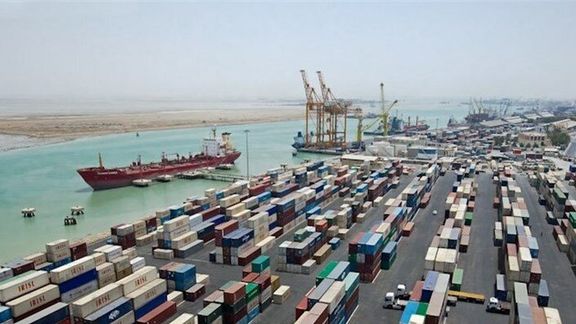
Abbas Argoun, a member of Tehran Chamber of Commerce, told Etemad newspaper that the higher rate in the calculation of import taxes results in cash flow problems for producers and businesses, because imported raw materials become more expensive and production costs rise.
But Argoun explained that lowering import duties now will cut into government tax revenues to the tune of one billion dollars.
Ali Ghanbari, expert in international economy, told Fararu news website that the decision is unlikely to reduce prices of imported goods or the cost of production.
“Instead of such hasty policies, the government must be seeking fundamental solutions to control inflation and high prices,” he said, adding that inflation and prices of basic commodities will continue to increase given the continuation of US sanctions and uncertainties regarding restoration of the 2015 nuclear deal.
Criticizing the government's decision to revive the 42,000 rial rate in import tax calculations, Hamidreza Salehi, a member of Tehran Chamber of Commerce, said to bring prices down the government could have reduced tariffs instead which could cause much less confusion and problems.
To compensate the hike in the prices of essential foods the government is paying around 4 million rials (about $15) to 30 percent of the population at the lowest-income groups, and around 3 million to 60 percent of the population each month. This means the government must spend the equivalent of $850-900 million a month to placate an impoverished population. It cannot afford such a huge cash handout every month and in fact, it has not paid the July stipend.
The special exchange rate was introduced in 2018 to control inflation when the United States pulled out of the Obama-era nuclear agreement known as JCPOA and imposed crippling sanctions on the Islamic Republic.